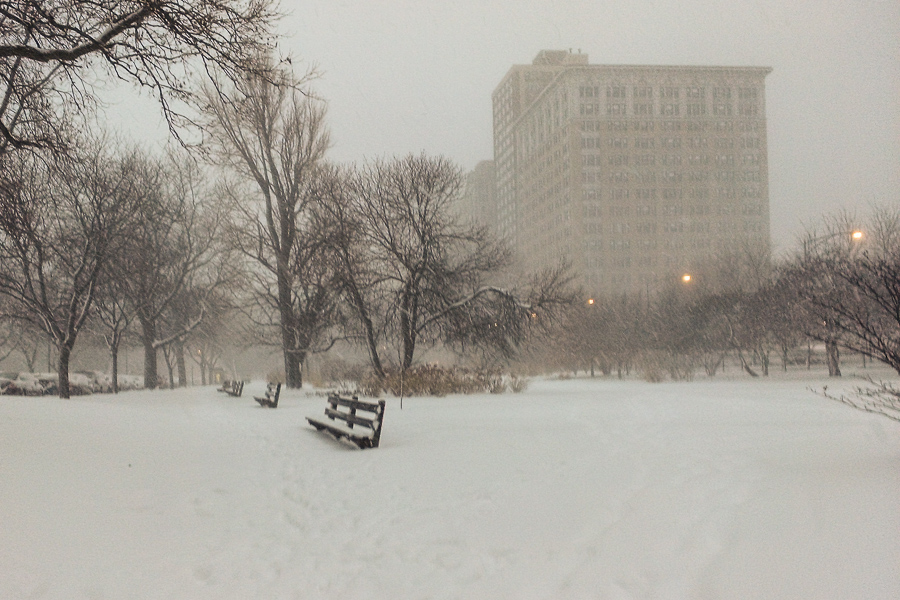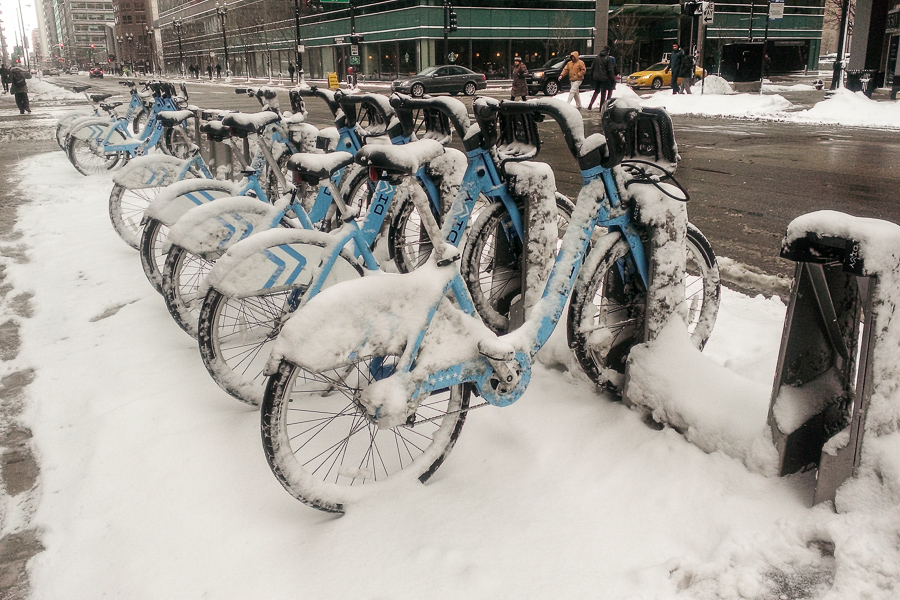The final score from my FitBit challenge over the weekend was: friend, 33,800; me, 37,800. Yesterday I gave Parker 3 hours of walks and also walked home from dinner instead of taking public transit or a Divvy, which got me almost to 23,800 steps (and 17.7 km) for the day.
There was a cost. My feet hurt, Parker was lethargic this morning, and I ate too much. And this week it's not likely I'll get 10,000 steps in every day this week because I've got an all-day meeting Wednesday. Which is probably a good thing, according to my feet and my dog.
Electric bikes that move between bike share stations may solve the bike-rebalancing problem:
The goal of this research is to derive algorithms directing the vans and trucks that bike-share operators use to shuffle bikes from station to station within a city. Trouble is, rebalancing is a moving target with several layers of complexity. You not only need to predict how many bikes a station will need at a certain time, but you need to minimize the (costly and time-consuming) movement of these vans and trucks—and you need to do it all while the system is in use.
Algorithms aren't the only option. Wald reports that at least one researcher is modeling a system in which driverless bike-share trucks could rebalance stations automatically. Of course, an easier way would be for bike-share systems to use electric bikes that shuffled themselves. But the thought of a bike traveling without a rider does bring up the problem of, you know, balance.
Meanwhile, Chicago's Divvy system will add another 100 or more stations next year, all the way up into Rogers Park and down to the far South Side.
Crain's reported this morning that the Divvy bike-share program lost $150k on $2.2 million in revenue last year:
Though the operating loss is not unexpected, and the amount is relatively small, it comes at a time when Mr. Emanuel is under intense pressure to cut costs and avoid tax increases. The bicycle-sharing program has not yet reached many neighborhoods, reinforcing a view that Divvy is merely a toy for yuppies and tourists.
With the program expected to ramp up this year, achieving profitability is crucial to its long-term success. The administration expects Divvy to at least break even this year.
The program has proved popular with out-of-towners, but it must win over more price-sensitive customers, such as city residents.
So, the program seems on track, and the $12.5-million infusion from Blue Cross certainly hasn't hurt. I'm encouraged.
 I'm David Braverman, this is my blog, and Parker is my 7½-year-old mutt. I last updated this About... page in September 2011, more than 1,300 posts back, so it's time for a refresh.
I'm David Braverman, this is my blog, and Parker is my 7½-year-old mutt. I last updated this About... page in September 2011, more than 1,300 posts back, so it's time for a refresh.
The Daily Parker is about:
- Parker, my dog, whom I adopted on 1 September 2006.
- Politics. I'm a moderate-lefty by international standards, which makes me a radical left-winger in today's United States.
- The weather. I've operated a weather website for more than 13 years. That site deals with raw data and objective observations. Many weather posts also touch politics, given the political implications of addressing climate change, though happily we no longer have to do so under a president beholden to the oil industry.
- Chicago (the greatest city in North America), and sometimes London, San Francisco, and the rest of the world.
- Photography. I took tens of thousands of photos as a kid, then drifted away from making art until early 2011 when I finally got the first digital camera I've ever had whose photos were as good as film. That got me reading more, practicing more, and throwing more photos on the blog. In my initial burst of enthusiasm I posted a photo every day. I've pulled back from that a bit—it takes about 30 minutes to prep and post one of those puppies—but I'm still shooting and still learning.
I also write a lot of software, and will occasionally post about technology as well. I work for 10th Magnitude, a startup software consultancy in Chicago, I've got more than 20 years experience writing the stuff, and I continue to own a micro-sized software company. (I have an online resume, if you're curious.) I see a lot of code, and since I often get called in to projects in crisis, I see a lot of bad code, some of which may appear here.
I strive to write about these and other things with fluency and concision. "Fast, good, cheap: pick two" applies to writing as much as to any other creative process (cf: software). I hope to find an appropriate balance between the three, as streams of consciousness and literacy have always struggled against each other since the first blog twenty years ago.
If you like what you see here, you'll probably also like Andrew Sullivan, James Fallows, Josh Marshall, and Bruce Schneier. Even if you don't like my politics, you probably agree that everyone ought to read Strunk and White, and you probably have an opinion about the Oxford comma—punctuation de rigeur in my opinion.
Thanks for reading, and I hope you continue to enjoy The Daily Parker.
My walk to the bus this morning, through a park path that I forgot they don't shovel:

I could have taken a Divvy bike but...well, for some reason they're closed today:

The good news is, it's stopped snowing for now. The bad news is, we're heading down to -17°C tonight.
I texted some friends in Atlanta and Houston with the top photo. For some reason they don't want to visit Chicago just now.
Apparently, Chicago's Divvy is really popular with tourists—and tourists have trouble returning the bikes on time:
Chicago's Divvy bicycle-sharing program took in up to $2.5 million during its first five months, a figure driven by tourists and others who bought daily passes and racked up the majority of overtime fees, according to a trove of preliminary customer data provided by city transportation officials.
As much as $703,500 came from late charges, which kick in when bicycles aren't returned within 30 minutes. Just a sliver of that money was generated from Divvy's clock-conscious annual members, who checked out bikes for short trips instead of hopping into taxis or riding public transit, city officials concluded.
It's not clear whether the Divvy public-private partnership, supported by $25 million in federal funding and $6.25 million in local matches, is turning a profit.
The article goes on to suggest that tourists have trouble understanding the point of the 30-minute time limit. It's not to prevent you from riding Divvy bikes; it's to keep Divvy bikes moving. If the program didn't have a 30-minute window, people would ride to their destinations, park the bikes, and ride back, possibly tying up a bike all day.
So the problem seems to be user education.
Still, I'm glad the program is making revenue. I really hope it's profitable.
While London's bike-share program seems to have some problems, Chicago is expanding its Divvy program, and asking for user input:
To cap off the Year of the Divvy, the city is crowdsourcing all you urban dwellers for suggestions on where to install 175 more stations across Chicago next year. Still no word on if they will make sure Divvy riders know not to ride the bikes on crowded Michigan Avenue sidewalks.
They bred like rabbits this summer, popping up in succession so close to each other. I could literally crawl from Divvy station to Divvy station if I had to. Doesn’t seem like the best use of multiple resources, especially in an area so accessible by transit. Sure, a Divvy station next to a major road or train stop makes sense, but four of them seems excessive.
The suggestion map shows interest in Divvy bikes clear up into the northern suburbs, but not so much on the south and west sides. Some wag even suggested a station at O'Hare.
The Atlantic Cities blog sounds the alarm about London's bike share program:
While the system recorded 726,893 journeys in November 2012, last month there were only 514,146. To cap these poor user figures, today Transport for London announced that the scheme's major sponsor, Barclays Bank, will pull out of its sponsorship deal in 2015. Given the bad publicity the system has received recently, it may be hard to find a replacement sponsor without some major changes.
None of this would matter much if London’s scheme was entirely self-sustaining. But while Paris's bike-share scheme actually makes money for the city, London's 4,000 bikes cost local taxpayers an average of £1,400 per bike per year. As the Daily Mail points out, this would be enough to buy each of the scheme's 38,000 registered users a £290 bike. Barclays has thus found its sponsorship deal a mixed publicity blessing – though the bank itself may be part of the problem. The £50 million it promised was never going to be enough, and the amount it has actually handed over so far suggests their ultimate contribution could be at little as half that.
So, Toronto and London are having problems; Chicago and Paris are booming. This is turning into a fascinating natural experiment.
First, housekeeping. After my last entry I managed to stay up for about 30 minutes, then slept for almost 7 hours. If you do the math you see that means I was up before 3am. So, even thought it's 1pm on Thanksgiving back home, I did some client work to clear it off my agenda for the rest of the week.
Now the point of this post:
Toronto’s plan to save Bixi transfers the bike-sharing program to the Toronto Parking Authority, turns over management to a Portland-based firm and uses money from Astral Media that was going to be spent on public toilets, the National Post has learned.
The deal, approved at a closed-door meeting of city council 10 days ago, will also see Toronto “eat” the $3.9-million in loan guarantees that the city gave to Bixi, owned by the City of Montreal, according to a source.
The city is negotiating with Portland-based Alta Bike Share, which manages Chicago's Divvy program, among others.
At least, by number of stations:
There’s more good news on the Divvy bike-share front. The Chicago Department of Transportation announced this morning that they scored a $3 million federal Congestion Mitigation and Air Quality Improvement grant to add 75 more docking stations to the 400 already planned. The system recently reached 300 stations and 3,000 bikes.
While the expansion of Divvy is an exciting development, CDOT’s press release exhibits a bit of Second City syndrome, boasting that with 475 stations Chicago will have the largest bike-sharing system in North America and the fifth largest in the world. While it’s true New York City currently has only 331 stations, and Montreal has 434, NYC has about 6,000 bikes and Montreal has about 5,000. Even if the ITEP funding comes through, we’d only have about 5,500 bikes, so it’s wishful thinking to claim Divvy will be larger in the future than the Citi Bike program is now.
On the other hand, as a Streetsblog reader Dennis Hindman pointed out, New York is about 3.07 times the population of Chicago. We currently have roughly one Divvy bike for every 725 residents, almost twice the service level compared to their ratio of one Citi Bike for every 1390 people. Once we expand to about 4,750 bikes, we’ll have one for every 571 Chicagoans, and with 5,500 bikes there will be one for every 497 citizens, almost three times the bike-share density of NYC. That will be something to brag about.
Also, they've got a deal with Chipotle to give away burritos to members next Tuesday. Cool.